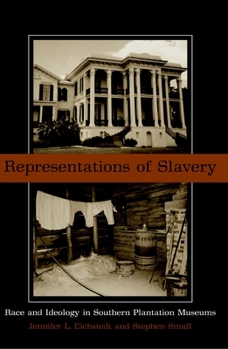Representations of Slavery: Race and Ideology in Southern Plantation Museums
Select Format
Select Condition 
Book Overview
How is slavery presented at the public and private plantation museums in the American South, almost 150 years after the Civil War? Jennifer L. Eichstedt and Stephen Small investigated this question in... This description may be from another edition of this product.
Format:Paperback
Language:English
ISBN:1588340961
ISBN13:9781588340962
Release Date:September 2002
Publisher:Smithsonian Books
Length:312 Pages
Weight:1.00 lbs.
Dimensions:0.8" x 6.0" x 9.1"
Customer Reviews
1 rating
Fascinating insights into how history is interpretted...and why
Published by Thriftbooks.com User , 16 years ago
African American history in general, and slavery in particular, should be an integral part of the story told at any plantation museum. After all, not a single plantation would have or could have existed without the complex institution slavery. Yet as the authors ably demonstrate, that story is not being presented by the vast majority of plantation museums. The authors create a useful framework to categorize the nature of interpretation. "Symbolic Annihilation" occurs when slavery is not acknowledged at all. "Trivialization and deflection" might actually be more insidious, because it presents slavery as benign, with happy "darkies" gratefully serving Massa."Segregation or marginalization" is at least a step in a better direction; here museums offer interpretative programs relating to the black experience, but in separate and less frequent programming. "Relative incorporation" occurs when the story of the plantation's black inhabitants is told at least alongside that of its white inhabitants. There is no reduction to a so-called "white vs black dichotomy" nor is this book in any way "white bashing." The sad truth is it's impossible to discuss slavery without mentioning the enslavers, and vice versa...and it is the life of the enslaver that is explored and commemorated by these museums. The authors simply argue that it's high time we heard about the enslaved as well, and that plantation museums offer the perfect opportunity to explore the institution in all its complexity. And that is apparently starting to happen only at Afro-centric sites, or publicly funded ones. The private foundations exist primarily to keep alive the myth of the Lost South, and integrating the story of slavery into those sites is - I fear - a lost cause.




